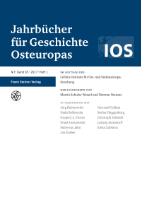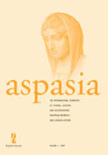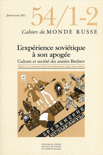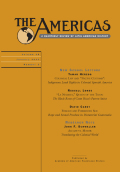
Journal of Belgian History-Revue Belge d Histoire Contemporaine-Belgisch Tijdschrift voor Nieuwste Geschiedenis
Scope & Guideline
Navigating the Complexities of Belgium's Past
Introduction
Aims and Scopes
- Colonial and Post-Colonial Studies:
The journal extensively covers Belgium's colonial history, particularly in the Congo, exploring the impacts of colonialism and the processes of decolonization. This includes analyses of economic, social, and political transformations in post-colonial contexts. - Political History and Activism:
A significant focus is given to political movements throughout Belgian history, including the roles of various political parties, resistance movements during wartime, and the evolution of nationalism. This reflects an interest in how political ideologies have shaped Belgian society. - Cultural History and Memory:
The journal examines cultural aspects of Belgian history, including the role of arts, media, and public memory in shaping national identity. This includes studies on the impact of war on culture, the representation of historical events in media, and the role of public commemorations. - Socio-Economic History:
There is a consistent emphasis on the socio-economic dimensions of Belgian history, analyzing labor movements, economic policies, and their effects on different communities. This includes a focus on industrialization, globalization, and economic transitions. - Interdisciplinary Approaches:
The journal employs interdisciplinary methodologies, integrating perspectives from sociology, anthropology, and cultural studies to enrich the historical narrative and provide a more nuanced understanding of Belgium's past.
Trending and Emerging
- Decolonization and Post-Colonial Discourse:
Recent publications indicate a growing emphasis on decolonization processes and their implications for contemporary Belgian society. This theme is crucial for understanding the legacies of colonialism and the ongoing discussions surrounding identity, memory, and reconciliation. - Gender and Activism:
There is an emerging focus on gender studies, particularly regarding women's roles in political activism and resistance movements. This reflects a broader trend in historical scholarship that seeks to highlight the contributions of marginalized groups in shaping historical narratives. - Transnational Perspectives:
The journal is increasingly embracing transnational approaches, exploring Belgium's historical connections with other countries and regions. This trend is significant for understanding the complexities of Belgian history in a global context. - Cultural Memory and Representation:
There is a rising interest in how cultural memory is constructed and represented in Belgium, particularly concerning commemorations of war and colonial history. This theme is important for examining the interplay between history, memory, and identity in contemporary society. - Environmental History:
Emerging discussions around environmental history and its intersections with social and economic history are becoming more prominent. This reflects a growing awareness of how historical events are interconnected with environmental changes and sustainability issues.
Declining or Waning
- Traditional Military History:
There has been a noticeable decline in the publication of studies focused solely on traditional military history, particularly regarding detailed accounts of battles or military strategies. This shift indicates a move towards more comprehensive analyses that incorporate social and cultural dimensions of warfare. - Narrow Nationalist Narratives:
The journal appears to publish fewer articles that focus exclusively on narrow nationalist narratives, suggesting a growing interest in more inclusive and nuanced approaches to Belgian identity that consider regional diversities and multicultural influences. - Historical Figures and Biographies:
There seems to be a waning interest in biographical studies of historical figures unless they are tied to broader themes such as resistance, activism, or cultural impact. This trend may reflect a preference for collective narratives over individual accounts. - Local Histories without Wider Context:
The focus on localized histories that do not connect to larger national or international contexts is diminishing. This suggests a shift towards examining local histories in relation to broader historical processes and global interactions.
Similar Journals

JAHRBUCHER FUR GESCHICHTE OSTEUROPAS
Decoding the Stories that Shaped Eastern EuropeJAHRBUCHER FUR GESCHICHTE OSTEUROPAS, published by FRANZ STEINER VERLAG GMBH, is a prominent academic journal dedicated to the exploration of Eastern European history. With its inception dating back to 1978, this journal has consistently provided a platform for scholarly discourse, contributing significantly to the understanding of the region's complex historical narratives. While the journal is not open access, it holds a solid reputation within the academic community, positioned in the Q4 quartile in history as per the 2023 category rankings, and stands at Rank #1636 within the Scopus Arts and Humanities History ranking. The convergence of its publication years throughout the decades emphasizes a long-standing commitment to historical research, thereby making it an essential resource for researchers, professionals, and students interested in Eastern European studies. Explore the intricate dynamics of historical events and cultural developments that shape Eastern Europe through this invaluable periodical.

NEW MEXICO HISTORICAL REVIEW
Connecting Cultures Through Scholarly HistoryWelcome to the New Mexico Historical Review, a premier scholarly journal dedicated to advancing the study of history within the cultural context of New Mexico and beyond. Published by the University of New Mexico, this journal features a wide array of peer-reviewed articles that explore historical narratives, regional studies, and interdisciplinary research in the field of history. With a commitment to scholarly excellence, the journal contributes significantly to the historical dialogue, reflected in its Scopus ranking within the 20th percentile among peers in the Arts and Humanities category. Although it currently does not offer Open Access options, the New Mexico Historical Review aims to engage researchers, professionals, and students alike by providing a platform for critical discourse and innovative perspectives on historical themes. Explore its rich history of publication, with a continuous release since the late 1970s, and discover how it has shaped the understanding of the intricate tapestry of New Mexico's past.

Aspasia
Fostering critical dialogue in gender studies.Aspasia is a distinguished open-access journal dedicated to the fields of Gender Studies and History, published by BERGHAHN JOURNALS and based in the United Kingdom. Since its inaugural issue in 2011 and achieving open access in 2019, Aspasia has committed to providing a platform that explores diverse scholarly perspectives on women's experiences and gender dynamics within historical contexts. With an impact factor reflective of its rigorous peer-review process, Aspasia has achieved notable rankings, including Q4 in Gender Studies and Q3 in History for 2023, indicating its growing influence within these disciplines. The journal is indexed in prominent databases, showcasing its relevance and contribution to ongoing academic discourse. Researchers, professionals, and students are encouraged to explore its rich content, fostering critical dialogue and advancing knowledge in the understanding of gender and historical narratives.

BULGARIAN HISTORICAL REVIEW-REVUE BULGARE D HISTOIRE
Advancing Historical Understanding: The Bulgarian PerspectiveBULGARIAN HISTORICAL REVIEW - REVUE BULGARE D HISTOIRE is a distinguished journal published by the PUBL HOUSE BULGARIAN ACAD SCI, providing a critical platform for the exploration and analysis of historical narratives pertinent to Bulgaria and its broader regional context. With an ISSN of 0204-8906, this journal has been a reservoir of scholarly research since its inaugural issue, recently covering years from 2001 to 2007 and again from 2009 to 2023. Despite its classification in the Q4 category of History, it uniquely contributes to understanding and preserving historical insights, as reflected in its modest but growing impact in the academic community, where it currently ranks #1405 out of 1760 in Scopus Analytics. The journal aims to engage researchers, professionals, and students by presenting a diverse array of articles, encouraging scholarly discourse that sheds light on historical complexities and advancements. While it currently does not adopt an open-access model, it remains a crucial resource for those engaged in historical studies, particularly in Eastern European contexts.

CAHIERS DU MONDE RUSSE
Advancing Knowledge in Russian Politics and SocietyCAHIERS DU MONDE RUSSE, published by EDITIONS ECOLE HAUTESETUDES & SCIENCES SOCIALES in France, is an esteemed journal dedicated to the interdisciplinary study of Russian history, culture, and politics. The journal embraces a variety of scholarly insights, making significant contributions to the fields of History, Political Science, and Sociology. With its ISSN 1252-6576 and E-ISSN 1777-5388, it has established a reliable presence in academic discourse since 1999, with continuous publications until 2024. Despite its current quartile rankings placing it in Q3 and Q4 categories in pivotal fields, CAHIERS DU MONDE RUSSE plays a critical role in fostering knowledge and discussion among researchers and students alike. It serves not only as a platform for disseminating research but also as a source of rigorous analysis and historical reflection, reflecting the dynamic evolution of Russian studies within the global context.

Journal of Scottish Historical Studies
Fostering Scholarly Exchange on Scottish NarrativesThe Journal of Scottish Historical Studies, published by Edinburgh University Press, is a vital resource for academics and practitioners interested in the nuanced history and cultural dynamics of Scotland. Established in 1996, this journal serves as a platform for rigorous research across several disciplines, including Anthropology, Cultural Studies, Economics, and History, making significant contributions to scholarly discourse in each area. Although it currently holds a Q4 ranking in several categories for 2023, its placement reflects the burgeoning interest and potential for impactful contributions within these fields. Researchers and students will find valuable insights and discussions that not only highlight Scottish historical perspectives but also connect broader themes within the humanities and social sciences. With an ISSN of 1748-538X and an E-ISSN of 1755-1749, the journal is committed to fostering scholarly exchange and advancing knowledge within its scope. The journal's accessibility outside of traditional subscription models continues to evolve, allowing for a wider dissemination of its rich content.

International Journal of Korean History
Exploring the Depths of Korean NarrativesInternational Journal of Korean History, published by Korea University, Center for Korean History, is a leading academic journal dedicated to the exploration and dissemination of research on Korean history, culture, and literature. Since its establishment in 2000, the journal has embraced an Open Access model, ensuring that groundbreaking scholarship is freely accessible to researchers, professionals, and students worldwide. With an ISSN of 1598-2041 and an E-ISSN of 2508-5921, the journal has shown impressive rankings, currently holding a Q3 category in both Cultural Studies and History, and a Q2 category in Literature and Literary Theory as of 2023. Its Scopus rankings further highlight its academic significance, sitting in the 81st percentile for Literature and Literary Theory and maintaining a strong presence in related fields. Operating from Seoul, South Korea, the International Journal of Korean History serves as a vital platform for scholarly dialogue and research dissemination, contributing significantly to the global understanding of the intricate narratives that shape Korean history.

INTERNATIONAL JOURNAL OF AFRICAN HISTORICAL STUDIES
Elevating African Historical Studies to Global DiscourseInternational Journal of African Historical Studies is a leading academic journal published by the African Studies Center at Boston University. With its ISSN 0361-7882 and E-ISSN 2326-3016, this journal serves as a vital platform for scholarly discourse in the fields of History, Cultural Studies, and Sociology. Renowned for its rigorous peer-reviewed research, the journal holds a commendable Q1 ranking in History and Q2 in Cultural Studies as of 2023, highlighting its influence and contribution to African historical scholarship. The journal has been published since 1976, consistently providing insightful analyses and critical research that engage with Africa's past and present, thereby enriching our understanding of global histories. Although it does not offer an open-access model, the journal is accessible through various academic databases and institutions. Its mission is to foster a deeper understanding of African histories by publishing high-quality, innovative research that reflects diverse perspectives, making it an essential resource for researchers, professionals, and students dedicated to the study of African history and cultural dynamics.

AMERICAS
Navigating the Diverse Landscapes of the Americas.AMERICAS, published by CAMBRIDGE UNIVERSITY PRESS, is a prestigious academic journal dedicated to the interdisciplinary study of the Americas, encompassing a broad range of cultural and historical perspectives. With an ISSN of 0003-1615 and an E-ISSN of 1533-6247, this journal serves as a pivotal platform for scholars and researchers aiming to explore the complexities and nuances of life in the Americas. It holds a commendable impact factor with a notable classification in the Q3 category for Cultural Studies and Q2 for History as of 2023, ranking it at #571/1760 and #574/1304 in respective fields according to Scopus. This journal's effective convergence of diverse historical timelines, particularly from 1969 through 2024, showcases its enduring commitment to scholarship. While open access options are not available, the journal remains an invaluable resource for researchers, professionals, and students looking to deepen their understanding of the cultural and historical dynamics of the Americas, thus facilitating academic discourse and furthering knowledge in the field.

Cadernos de Historia
Charting New Territories in Historical ResearchCadernos de Historia, published by the Pontifícia Universidade Católica de Minas Gerais, is a pivotal open-access journal that has been enriching the field of historical studies since its inception in 2010. With an ISSN of 2237-8871, this journal provides a platform for innovative research and critical discourse in history, appealing to an audience of academics, researchers, and students alike. Located in Belo Horizonte, Brazil, the journal fosters international collaboration and dissemination of knowledge, ensuring that the latest findings in historical research are accessible to a global community. While the journal’s HIndex is currently not specified, its commitment to scholarly excellence is evident through its rigorous peer-review process. Cadernos de Historia stands out as a vital resource for those engaged in the study of historical narratives, methodologies, and interdisciplinary approaches, making it an essential addition to any historian's collection.